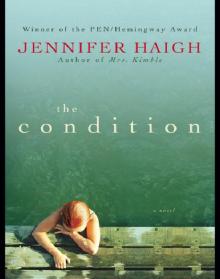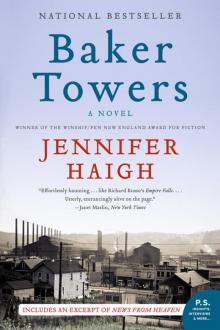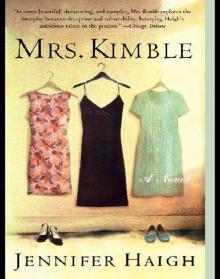- Home
- Jennifer Haigh
Baker Towers Page 11
Baker Towers Read online
Page 11
Poor Miss Peale. She’d seemed stunned when Joyce told her the news. “The air force?” she’d repeated, as if she’d never heard of it. “Joyce, are you sure?”
“It’s a fine opportunity for a young woman.” She’d been told this by the recruiter and had repeated it to her entire family.
“But it seems so—drastic.”
“I’ve given it a lot of thought,” Joyce assured her. The reaction disappointed but did not surprise her. Her mother, Dorothy, even her brother Georgie had failed to understand. There was no reason to think Miss Peale would be different.
Later, she saw that she hadn’t explained it properly. She wasn’t like Georgie, desperate to leave Bakerton; if she’d merely wanted to escape her hometown, any sort of job would have sufficed. File clerk or factory girl. Cleaning houses for money—or, if she managed to find a husband, for free. But Joyce longed to devote herself to something of consequence; of the paths open to her, only the military seemed meaningful enough. She was a Bakerton girl with no education and no prospects. Serving her country was her only chance, the only way her life could ever be important.
She’d considered herself, if not born to it, then raised for it. In every important way, the war had defined her childhood. Of all the Novak children, only Joyce had spent her evenings in the parlor with their father, listening to Lowell Thomas: the bombings and casualties, the daily movements of troops. As a youngster, she’d saved her gum wrappers, valuable sources of aluminum. Though she hated knitting, she’d made afghan squares for the Red Cross. Later, in junior high, she’d organized twice-yearly collection drives, gone door-to-door asking for old tires, used pots and pans, anything made of metal or rubber or tin. She was a proud girl, and begging was not in her character; but she had done the work gladly. Her small humiliation was nothing compared to the sacrifices of the soldiers. The same sacrifices she would make later, as an adult.
She was sixteen when the war ended, almost ready to enter the world. After the initial joy of the surrender, she was at a loss. Working in an office as Dorothy did, or in a store like Georgie, would have seemed a capitulation. Her whole life she’d imagined her future in uniform. She couldn’t picture it any other way.
One afternoon, coming out of the butcher shop in Little Italy, Joyce glimpsed a short, stout figure in a familiar plaid coat.
“Irene!” she called.
The girl turned and broke into a grin. The two friends embraced, laughing and exclaiming. For the first time in weeks, Joyce felt at home.
“Good to see you, stranger,” she teased. “Did you lose my address? I thought you fell off the planet.” She linked her arm through Irene’s. “Come on. Let’s go have a pastry at Bellavia’s. My treat.”
“Joyce, I can’t,” Irene stammered. “I need to get home.” Her watery blue eyes were bloodshot. There was a roll of extra flesh beneath her chin.
“Not even for a minute?” Joyce looked at her closely, shocked by how she’d changed. Irene wore rimless eyeglasses, and the left side of her face looked swollen. To Joyce she looked forty years old.
“Irene,” she said softly. “Is everything all right?”
“I have a toothache.” Her hand went to her cheek. “It’s driving me crazy. And I’m kind of in a hurry. I should have been home at four. My mother’s going to wonder what happened to me.”
“Are you still working at the station?” After graduation, Irene had been hired to answer phones at KBKR. The pay was lousy, she’d written, but it kept her in lipstick and movie tickets.
“Oh, no. I quit that ages ago. I’m at the factory now. Listen, I have to run.” She gave Joyce’s elbow a squeeze. “When do you head back to North Carolina?” She started down the street, not waiting for an answer.
“It’s great to see you,” she called over her shoulder. “I’ll try and stop by the house before you leave town.”
Joyce watched her go. The factory, she thought wonderingly. A few years ago, Irene had been as horrified by the place as Joyce was. Now she’d quit a perfectly good desk job and—if Joyce was any judge—would work in the factory for the rest of her life. Bakerton did this to people: slowly, invisibly, it made them smaller, compressed by living where little was possible, where the ceiling was so very low. Joyce thought of her father, a big man whom Bakerton had diminished. After thirty years of mining he’d walked with a stoop. Once, to show her how he spent his workday, he’d crouched on his hands and knees beneath the kitchen table, the contorted posture of a miner in low coal.
How can I stay here? Joyce thought. How much smaller can I get?
“Tell me what you see.”
The doctor spoke in a deep voice. Joyce caught her mother’s eye, nodding encouragement. Rose was shy around strangers, self-conscious about her accent. The gaze of a stranger, a man especially, could render her speechless.
“Flashes of light,” Joyce interjected. “And her vision is blurred.”
“It’s like I look at everything through a veil,” Rose added.
The doctor made a note in a folder.
“Does she need glasses?” Joyce asked.
“No,” he said curtly. “That wouldn’t help.” He turned to Rose. “Have you been tired lately?”
“Sometimes,” she said softly.
“Any unusual thirst?”
Joyce thought of her mother standing at the sink, drinking two tall glasses of water, one after the other. She had never considered this odd. Rose had done it for years.
“Have you gained or lost weight?”
Rose explained, haltingly, that she cooked too much since the children had left. If she’d gained a few pounds, that must be why.
In the end a nurse came to draw blood. “What’s the problem?” Joyce asked the doctor.
“I won’t know for certain until I see the test results, but I suspect that your mother is diabetic.” Briefly he explained the nature of the disease: a problem with the pancreas, a hormone it failed to secrete.
“But what does that have to do with her eyes?”
He explained that diabetes puts stress on all the organs: the kidneys, the heart. The eyes were particularly vulnerable. “There’s another doctor she should see.” He wrote a name on a card. “His name is Lucas. He’s an eye specialist in Pittsburgh.”
Joyce took the card. She had never been to Pittsburgh in her life.
“One more thing,” said the doctor. “Mrs. Novak, could you take off your shoes?”
Rose bent and unbuckled them. The doctor reached for her foot and held it in his lap. He took a wooden tongue depressor from the table behind him and ran it along the sole of her foot.
“Can you feel this?” he asked.
Rose nodded.
“What about this?” He prodded her skin with the end of the stick, then repeated the test on her other foot.
“Diabetes can affect sensation in the extremities,” he explained. “Your mother might cut herself and not feel it, and the consequences could be serious. Diabetics are prone to infection, and their wounds don’t heal normally. What would be a minor abrasion in a healthy person could become gangrenous. The patient could end up losing a foot.”
“Is that common?” Joyce asked, horrified.
“It’s not uncommon. I’ve seen cases.” He turned to Rose. “I don’t mean to scare you, Mrs. Novak. But it’s important that you take care of your feet.”
Rose leaned close to Joyce and whispered into her ear.
“My mother has a question,” said Joyce. “Is there some kind of medicine she can take?”
“I’m afraid not. There are no easy treatments for diabetes. The most important thing is to keep an eye on her diet. No sweets. Cut back on bread and starches.” He reached into a drawer and handed Joyce a printed leaflet. “If she lost some weight along the way, that certainly wouldn’t hurt.”
Joyce took the paper. It was a list of foods, with calorie counts.
“Diabetes is a serious illness,” said the doctor. “Your mother will have to be very careful. I
f she can control her diet, it will add years to her life.”
LATER, AT HOME, Joyce made a tour of the yard, a pad and paper in hand. Two broken windows. The back screen door was nearly off its hinges. The front porch had several rotten floorboards. Someone as heavy as her mother could easily step right through.
She went around to the cellar door, down the steps to the basement. Water pooled near a crack in the foundation, another item to add to her list. The shelves were loaded with canned peppers and tomatoes, boxes of empty Ball jars. Broken glass crunched beneath her shoes. She thought of Rose in her bare feet, placing the jars on the shelves. How easily, and how often, she might drop a jar.
Her father’s toolbox was where he’d left it, on a low table in the corner. Joyce knew from her mother that Georgie seldom visited—he was busy with his fancy wife, his baby son, his job at the department store. When he did come to Bakerton, it clearly never occurred to him to fix anything. The toolbox was covered with dust.
She pried open the rusted latch. Inside, the tools were neatly stacked. One by one she lifted them out: hammers, wrenches, a framing square, several pairs of pliers. Exquisite, heavy tools, handmade by her uncle Casimir, who’d forged wheels for mining cars during the day and worked nights in his own blacksmith shop. The wooden grips were worn smooth from use. From her father’s hands. Tears stung at her eyes. She closed the box.
The upstairs door squeaked open. She heard footsteps on the stairs.
“Joyce?” Her little sister stood in the doorway to the kitchen, a macaroon in her hand.
“Don’t come down here. There’s broken glass on the floor.”
Lucy took another step. She peered into the dimness. “Why are you crying?”
“I’m not.” Joyce turned away. “Go back upstairs.”
The door closed. Joyce fumbled in her pocket for a handkerchief. Her hands were dirty from the tools. I must look a sight, she thought. Carefully she replaced the tools. She blew her nose and went out through the cellar door.
She had come home to help her mother. That was the explanation she’d given her superior officer, her few friends in the service; it was the story she’d told herself. Rose’s letter—I don’t feel so good. Every day I get a headache. I think maybe I need glasses.—had come at a convenient time. She hadn’t asked for help. Joyce had simply volunteered. She was disillusioned with military life, fed up and furious; and here was an escape route, a way to save herself without losing face. A sick mother—she was ashamed to admit it, but she had even liked the sound of that. Explaining the situation to her CO, she’d felt noble and high-minded. She hadn’t stopped to consider whether any of it was true.
She thought of the games she and Dorothy had played as children: hide-and-seek, blindman’s bluff, duck-duck-goose. At the beginning of the game all players were equal, and anything was possible—every kid in the neighborhood running breathless and excited, like bees humming around a hive. Then someone found you, or pointed you out, or slapped your sweaty back, and like it or not, you were it.
Georgie and Dorothy had escaped the hand—whether through speed or calculation, or just the simple dumb luck of being older, Joyce couldn’t say. But the hand had landed on her shoulder. She, apparently, was it.
Duck, duck, goose.
THE EYE SPECIALIST was booked until November. Joyce took the first appointment available, a Friday morning, the day after Thanksgiving. At the drugstore she bought a road map of Pennsylvania and spread it before her on the counter. She located Pittsburgh immediately, an agglomeration of bright yellow at the southwest corner of the state. Bakerton was harder to find, the name in faint italicized letters, the smallest typeface on the map.
She set out early the next morning, in sturdy shoes. In half an hour she had reached the edge of town, where a car dealership had just opened. She stood in the lot a moment, looking around uncertainly.
A boy in a suit approached her. “Can I help you, ma’am?” He was tall and gangly, his face studded with pimples. He looked barely old enough to drive.
“I need to buy a car.” She pointed to a blue sedan at the edge of the lot. “How much is that one?”
“That Plymouth over there?”
“Yes,” she said. “The Plymouth.”
He named a figure that seemed impossible. She had a small savings account, where she’d deposited her last check from the air force.
“That’s more than I can afford,” she said, embarrassed. Her own discomfort irritated her. Brush it off, she thought. He’s just a kid. Who cares what he thinks?
“Do you have one less expensive?”
He pointed to a smaller car. “That Rambler is four hundred dollars. It’s secondhand, but it runs good. You want to take it for a test drive?”
She looked him in the eye. “I don’t know how to drive.”
He stared at her, mystified. “Then what do you need a car for?”
Mentally she ticked off a list: the Wojick boys, the half-bright Poblockis, her brother Sandy, who’d “just picked it up.” Every male on Polish Hill knew how to drive. How difficult could it be?
“I’ll learn,” she said.
THE BANK WAS BUSTLING that morning. Tellers stood at their windows, silently counting. A half-dozen customers waited in line. Joyce approached a window.
“I’d like to fill out a job application,” she said.
The teller, a short round-faced man, eyed her briefly. “Hang on a second.” He resumed counting, then wrote a figure on a scrap of paper. He placed the paper atop the stack and wrapped it with a rubber band.
“Stiffler,” he said to the man at the next window. “This lady wants to fill out a job application.”
Two men turned in her direction. One, Irving Stiffler, was her brother’s age; he’d come back from the war missing a foot. Joyce had seen him around town and was amazed by how well he walked, with only a slight limp.
“Hello, Joyce,” Stiffler said, nodding. “You’ll have to talk to the manager. Have a seat, and I’ll tell him you’re here.”
Joyce sat on the vinyl sofa near the window, aware of the silence in the room. In a moment the clerks resumed counting. Two men in overalls came in the front door. The bank opened early on Friday mornings to accommodate the miners, the Hoot Owl crews who stopped to cash paychecks on their way home from work.
Half an hour passed. Finally, a portly man in shirtsleeves came toward her. He eyed her uncertainly, then sat beside her on the sofa, hitching up his trousers to preserve their creases. “What kind of a job are you looking for?”
“Secretarial,” she said. “I type seventy-five words a minute. I can do just about anything involved with running an office.”
“Have you tried over at the factory?”
She blinked. He seemed not to have heard her. She tried again. “Actually, what I’m looking for is an office job. A teller position would be ideal.”
He scratched his head. “The thing is, we generally don’t hire girls for those jobs. We did years ago, during the war, but these fellows”—he gestured with a nod of his head—“are all veterans.”
“I see.” She wished, for a moment, that she’d worn her uniform. “I’m just out of the air force, myself.”
A smile played at his lips. “Good for you,” he said. “But these men are combat veterans—wounded, some of them. With families to support. You can understand that, can’t you?”
“Perfectly,” she said evenly. “I’ve got a family as well, sir. My mother is a widow, and my younger brother and sister are still in school.”
The man glanced at his watch. “Well, I can’t help you. We aren’t hiring right now.” He rose. “Try over at the factory,” he said again. “Good luck to you, Joyce.”
On Saturday afternoon she left the house carrying a tin of macaroons. Her mother baked them every Friday. Unless Joyce watched her closely, she’d eat half of them herself.
The Jevics lived in a dilapidated frame house, a big, barnlike structure near the Number One tipple. Irene was the th
ird of ten children; every few years, it seemed, her father built another bedroom onto the house. As a little girl, Joyce had been intimidated by the place, not just its size but its strangeness. All her other friends had lived in company houses—three rooms upstairs, three rooms down. It had never occurred to her that a house could be built any other way.
In the Jevics’ backyard, boys ran and shouted. Joyce climbed the porch steps and knocked at the front door. She sensed a flurry of activity behind it: a radio playing, a baby crying, tiny voices raised in anger or joy. Then Irene’s mother opened the door, a dark-haired baby on her hip.
“Joyce Novak!” She held the door open. “For God’s sake, I didn’t know you were back.”
Joyce stepped inside. Shrill voices in the next room, the excited chatter of little girls. “I brought you some macaroons. I remember how you liked them.”
“You’re a sweet girl. Those Eyetalian cookies are delicious.” Mrs. Jevic shifted the baby to her other hip. She was a big, red-faced woman with wide, startled-looking eyes, the same watery blue as Irene’s.
She led Joyce to the kitchen. “Irene’s at the dentist, having that tooth pulled. She’ll be back any minute. Sit down and have some tea.”
Joyce sat at the table, its Formica top extended with a plywood leaf. Bottles and rubber nipples dried on a towel by the sink. Beside the back door was a metal washtub, overflowing with different-size shoes. The place was as chaotic as a kindergarten.
“Have you met little Susan?” Mrs. Jevic asked, smoothing the baby’s hair.
“No,” said Joyce. “She’s adorable. How old is she?”
“A year next month.” Mrs. Jevic filled the teapot with water. Susan squirmed and let out a squeal.
“Here we go again,” said Mrs. Jevic. “You won’t be quiet—will you?—until your mother comes home.”
Your mother? Joyce thought.

 The Condition
The Condition Zenith Man
Zenith Man Baker Towers
Baker Towers News From Heaven
News From Heaven Mrs. Kimble
Mrs. Kimble